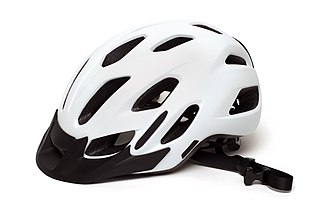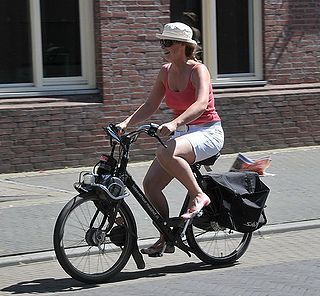Related Research Articles

A motorcycle is a two or three-wheeled motor vehicle steered by a handlebar from a saddle-style seat.

A motorcycle helmet is a type of helmet used by motorcycle riders. Motorcycle helmets contribute to motorcycle safety by protecting the rider's head in the event of an impact. They reduce the risk of head injury by 69% and the risk of death by 42%. Their use is required by law in many countries. However, only 10.4% of all motorcyclists wear helmets, according to the World Health Organization in 2016.

Road traffic safety refers to the methods and measures used to prevent road users from being killed or seriously injured. Typical road users include pedestrians, cyclists, motorists, vehicle passengers, and passengers of on-road public transport.

A bicycle helmet is a type of helmet designed to attenuate impacts to the head of a cyclist in collisions while minimizing side effects such as interference with peripheral vision.

In the United Kingdom, the term Compulsory Basic Training is a preliminary vehicular training course which must be completed by people wishing to ride a motorcycle or moped unaccompanied on the road, and remains valid for 2 years upon completion. It was introduced in Great Britain on 1 December 1990 as a means of reducing accidents on the road caused by inexperienced drivers by reviewing aspects of riding both on and off the road with a qualified motorcycle instructor registered with an Approved Training Body (ATB). If a full car licence was obtained before 1 February 2001 it is not necessary to complete a CBT course to ride a moped.

Motorcycle safety is the study of the risks and dangers of motorcycling, and the approaches to mitigate that risk, focusing on motorcycle design, road design and traffic rules, rider training, and the cultural attitudes of motorcyclists and other road users.

A motorized bicycle is a bicycle with an attached motor or engine and transmission used either to power the vehicle unassisted, or to assist with pedalling. Since it sometimes retains both pedals and a discrete connected drive for rider-powered propulsion, the motorized bicycle is in technical terms a true bicycle, albeit a power-assisted one. Typically they are incapable of speeds above 52 km/h (32 mph); however, in recent years larger motors have been built, allowing bikes to reach speeds of upwards of 113 km/h.
State motorcyclists' rights organizations (SMROs) exist in about 32 US states, 25 of which call themselves "ABATE of ," the rest going by various other names. SMROs advocate for a point of view in motorcycling that is, in general, opposed to mandatory helmet laws, required motorcycle safety inspections, mandatory rider training and licensing, and other similar regulation. Instead SMROs favor optional or voluntary motorcycle rider safety education, training, and licensing, and greater public awareness of motorcyclist safety issues. They also favor stronger penalties for car driver infractions such as right of way violations, or when drivers are at fault in accidents that harm motorcycle riders. SMRO activities include lobbying legislatures, letter writing campaigns, and paying for public service announcements and political advertisements. To carry out lobbying at the national level, a coalition of SMRO's created the Motorcycle Riders Foundation (MRF) to lobby in Washington DC. The SMROs and MRF are often allied with the American Motorcyclist Association (AMA) on legislative issues.

This is a list of numbers of motorcycle deaths in U.S. by year from 1994 to 2014. United States motorcycle fatalities increased every year for 11 years after reaching a historic low of 2,116 fatalities in 1997, then increased to over 5,000 around 2008 and then plateaued in the 4 to 5 thousands range in the 2010s. In nine years motorcycle deaths more than doubled from the late 1990s to 2008. Despite providing less than 1% of miles driven, they made up 15% of traffic deaths in 2012.
Many countries have enacted electric vehicle laws to regulate the use of electric bicycles, also termed e-bikes. Some jurisdictions have regulations governing safety requirements and standards of manufacture. The members of the European Union and other regions have wider-ranging legislation covering use and safety.

Motorcycling is the act of riding a motorcycle. For some people, motorcycling may be the only affordable form of individual motorized transportation, and small-displacement motorcycles are the most common motor vehicle in the most populous countries, including India, China and Indonesia.

Motorcycle training teaches motorcycle riders the skills for riding on public roads. It is the equivalent of driver's education for car drivers. Training beyond basic qualification and licensing is available to those whose duty includes motorcycle riding, such as police, and additional rider courses are offered for street riding refreshers, sport riding, off-road techniques, and developing competitive skills for the motorcycle racetrack.

The Snell Memorial Foundation is a nonprofit organization created to provide a high quality standard of safety for helmets. Founded in 1957, the foundation is named after William "Pete" Snell, a popular sports car racer who died in 1956 of head injuries he received when the racing helmet he wore failed to protect his head. A group of friends, scientists, physicians, and others joined together to create a group that would promote research and education as well as test and develop standards to improve the effectiveness of helmets.

Lane splitting is riding a bicycle or motorcycle between lanes or rows of slow moving or stopped traffic moving in the same direction. It is sometimes called whitelining, or stripe-riding. This allows riders to save time, bypassing traffic congestion, and may also be safer than stopping behind stationary vehicles.

The Hurt Report, officially Motorcycle Accident Cause Factors and Identification of Countermeasures, was a motorcycle safety study conducted in the United States, initiated in 1976 and published in 1981. The report is named after its primary author, Professor Harry Hurt.

The British Motorcyclists Federation (BMF) is a motorcycle riders' rights group in the United Kingdom. The BMF was founded in 1960 as the Federation of National One Make Motorcycle Clubs to counter accusations of "leather-jacketed hooligans". It renamed itself the BMF in 1965. The group lobbies for motorcyclists' interests at local, national and European levels.

Road speed limits in the United Kingdom are used to define the maximum legal speed for vehicles using public roads in the UK.

The following outline is provided as an overview of motorcycles and motorcycling:

Some countries and lower jurisdictions have enacted laws or regulations which require cyclists to wear a helmet in certain circumstances, typically when riding on the road or a road-related area. In some places this requirement applies only to children under a certain age, while in others it applies to cyclists of all ages.
Fred Hill was a British activist and retired school teacher who protested against the compulsory wearing of crash helmets on motorcycles.
References
- ↑ "MOTOR CYCLISTS (HELMETS) (Hansard, 5 April 1973)". Hansard. Retrieved 9 February 2021.
- ↑ "About » British Motorcyclists Federation". British Motorcyclists Federation. Retrieved 16 December 2020.
- ↑ The Effect of the 1992 California Motorcycle Helmet Use Law on Motorcycle Crash Fatalities and Injuries. Jess F. Kraus, MPH, PhD; Corinne Peek, MPH; David L. McArthur, PhD, MPH; Allan Williams, PhD. JAMA. 1994;272(19):1506-1511
- ↑ "Rules for motorcyclists (83 to 88) - The Highway Code - Guidance - GOV.UK". www.gov.uk. Retrieved 16 December 2020.
- ↑ "Standard No. 218; Motorcycle helmets" (PDF). Code of Federal Regulations, Title 49, section 571.218. National Highway Traffic Safety Administration. 1 October 2007. Retrieved 19 September 2008.
- ↑ "ECE Regulation 22: Protective Helmets and their visors for drivers and passengers of motor cycles and mopeds" (PDF). Economic Commission for Europe. 20 February 2002. Retrieved 9 May 2012.
- ↑ "Motorcycle and bicycle helmet use laws". Insurance Institute for Highway Safety. August 2012. Retrieved 2 August 2012.